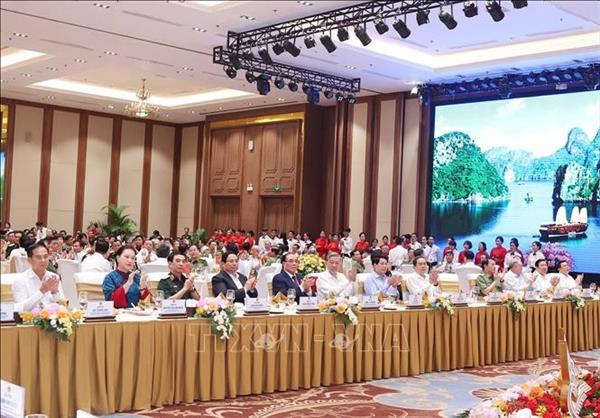Prime Minister Pham Minh Chinh directed the Vietnam Oil and Gas Group (Petrovietnam) to restructure itself into a national industrial-energy group while addressing the firm's year-end review conference in Hanoi on December 28.
He urged the firm to show accelerated, decisive, effective, and sustainable transformations, fostering closer and more efficient coordination with ministries, agencies, localities, and businesses.
Highlighting the nation’s developmental goals for 2030 and 2045, and strategic breakthroughs and major tasks outlined at the 13th National Party Congress, the PM stressed the importance of strong economic breakthroughs in 2025, the final year of the five-year socio-economic development plan (2021-2025). To achieve this, state-owned enterprises, especially Petrovietnam, must thoroughly review their business plans for 2025, aiming for the highest possible double-digit growth rate.
The Government leader said Petrovietnam should surpass its limits, achieve annual growth rates of 15-20% by 2025, and contribute to the national GDP growth rate of 8% that year and double-digit rate in following years.
He encouraged the group to adopt intelligent corporate governance practices, strictly comply with safety, security, and environmental protection regulations, and ensure the safe and efficient operation of its facilities.
PM Chinh asked Petrovietnam to develop a strategy and restructuring plan aligned with the sector's goal of becoming a national industrial and energy corporation. The group must uphold its dominance in the traditional oil and gas area while expanding into renewable and clean energy, enhancing its position in global energy value chains, he said.
He called for the modernisation of infrastructure and mastery of offshore wind power technologies, including the development of turbines, blades, and foundations, alongside the enhancement of human resources training and governance capacity.
He instructed the group to effectively implement the Politburo’s Conclusion No. 76-KL/TW and the Government’s Resolution No. 38/NQ-CP on the development strategy for Vietnam’s oil and gas sector. At the same time, it must promote innovation, technology improvement, and digital transformation with a focus on building a database, he said.
The PM highlighted Petrovietnam's critical role in ensuring energy, food, economic, maritime sovereignty and social security, underlined that the group’s achievements in 2024 and throughout its 63-year history have made significant contributions to the country’s socio-economic development, the safeguarding of national sovereignty, and ensuring national energy security.
In 2024, Petrovietnam has fully met and surpassed critical targets across all operational fields, including oil and gas production, power generation, and fertiliser production, achieving high growth rates. The group ensured uninterrupted safety and security across all units, facilities, plants, and drilling rigs. Remarkably, domestic crude oil production targets for 2024 were achieved two months and three days ahead of schedule.
Petrovietnam set a new record in total revenue, surpassing the milestone of 1 quadrillion VND, a 36% increase compared to the pre-COVID-19 period, contributing nearly 9% of the country’s GDP and paying 165 trillion VND (6.48 billion USD) into the State budget, a 52% increase compared to the pre-pandemic period.
Strategic projects such as the Thai Binh 2 thermal power plant and the Nhon Trach 3 and 4 power plants were implemented on schedule. Additionally, the group took the lead in renewable energy, particularly offshore wind power.
For the first time, Petrovietnam achieved record-breaking growth across all financial indicators compared to the pre-COVID-19 period. Consolidated revenue reached 601 trillion VND, up 51%; revenue from the parent company alone totalled 270 trillion VND, a 237% increase; and pre-tax profits of the parent company stood at 35.1 trillion VND, a 45% increase. Consolidated profits remained strong, maintaining over USD 2.3 billion annually. With these results, the group surpassed its comprehensive five-year financial targets, approved by the Prime Minister, in just four years (2021-2025)./.


















